Medical Cart Technology and Trends
With the complicated nature of patient care, healthcare providers are challenged to deliver the best care in the most effective way for enhanced patient’s safety, diagnostic accuracy, and better treatment outcome. Recent advancements in computer technology have helped healthcare providers attend to patients faster and more efficiently, while reducing the risk of medical errors. It has also helped in bringing a higher level of test results accuracy for laboratories and medical testing facilities and offering a higher level of safety for operating rooms.
Medical carts were introduced in hospitals for point of care treatments so nurses and doctors can have the mobility required to bring treatments to patients where needed, whether in emergency rooms, treatment rooms, or immobilized patient rooms. Some common medical carts seen in healthcare facilities include mobile respiratory carts for respiratory care, nursing supply carts for nurses to administer treatments, ultrasound carts for ultrasound therapy, crash carts for emergency treatments, treatment carts carrying medical supplies and medications for wound treatments and injuries in critical care cases, and anesthesia carts for surgery center use.
Among its many benefits, medical carts equipped with touch panel PCs also make it possible for healthcare providers to access patient records at point of care, thus lessening delays in patient treatment. It allows for effective identification of the correct medications and administering accurate dosages to patients during critical situations. Real-time access to patient data is also integral to this process of improved patient treatment and safety.
Medical Cart’s Technological Advancements for Improved Patient Treatment
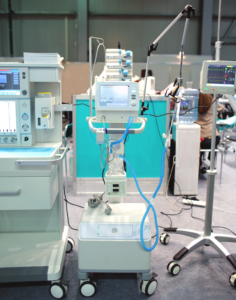 Medical carts equipped with advanced touch panel PCs with slim designs are desirable for enhanced mobility. These touch panel computers can offer scalable computing power. Some are equipped with Intel® Core™ I processors and provide the computing performance required to run complex electronic medical record (EMR) applications wherever they are used.
Medical carts equipped with advanced touch panel PCs with slim designs are desirable for enhanced mobility. These touch panel computers can offer scalable computing power. Some are equipped with Intel® Core™ I processors and provide the computing performance required to run complex electronic medical record (EMR) applications wherever they are used.
An example of how these medical touch panel PCs can help improve quality of care and eliminate disastrous results from human errors is as follows: A treatment cart can be filled with several different combinations of medications. Human error can cause an accidental administration of the wrong drug or dosage to a patient. These possibly deadly outcomes can be minimized by the implementation of new identification technology that a medical touch panel computer can support, the use of radio-frequency identification technology (RFID).
RFID tags are composed of a microchip and an antenna, which are enclosed within plastic or silicon. They have the ability to store data. RFID tags are placed on the medications so that a RFID scanner can easily and accurately identify them. When the tags are scanned, they receive an electromagnetic field from the scanner, which causes them to send data as radio waves. The RFID scanner is able to capture these waves and interpret the data.
The scanner simply needs to be attached to a touch panel computer with a cloud-based software to communicate necessary information. There are many uses for this RFID system beyond patients’ medicine administrations. It offers the benefits of smart medical automation by automatically alerting medical staff of expiring medication in stock, inventory management and control, and much more. The medical carts can change hands several times in a single day, which leaves room for many items to be misplaced or lost. Manually stocking and managing the contents of each medical cart can take valuable time away from a healthcare provider’s day. Allowing the touch panel PCs, with the right software, to automate inventory management can lead to effective time management. This will allow healthcare providers to better focus on treating their patients.
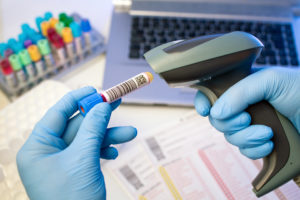 Healthcare providers are also making a shift from dealing with mountains of paperwork to using touch panel PCs to maintain EMRs. The mobility of medical carts allows doctors to access and update patient records at point of care with ease, instead of spending time digging through stacks of paper. In the case of emergencies where quick response is key, having EMRs easily accessible on a nearby medical cart can make all the difference.
Healthcare providers are also making a shift from dealing with mountains of paperwork to using touch panel PCs to maintain EMRs. The mobility of medical carts allows doctors to access and update patient records at point of care with ease, instead of spending time digging through stacks of paper. In the case of emergencies where quick response is key, having EMRs easily accessible on a nearby medical cart can make all the difference.
The EMR phenomenon has revolutionized healthcare. Patient information entered into a touch panel PC can be transferred to a secure server within the local area network, where it can be accessed anywhere. Hospitals can provide authorizations for a different hospital or treatment facility to access medical records of the same patient securely. With the right computers and application software, patient’s data collected can be analyzed for patterns that might help in early disease detection, or perhaps even prevention. If physicians have easy access to aggregate data and analytics collected from patients with similar conditions, the learning can help improve treatment plans and, ultimately, patient outcomes.
Advanced medical carts equipped with medical computers can also help streamline a healthcare provider’s daily workflow. They can eliminate the process of writing down notes and relocating to a different area to key the data at a workstation. There is also no risk of misplacing valuable information or forgetting to add in new details to patient records at a later time. Having an ability to update information at point of care that can be accessed near real-time by other medical personnel will help improve the treatment communication process.
Axiomtek’s Medical-Grade Touch Panel PCs and Industrial Touch Panel PCs
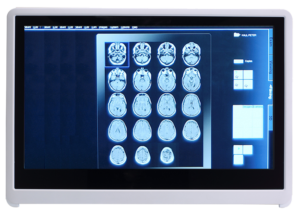 Healthcare customers have a variety of options, i.e., UL60601-1- or EN60601-1-certified medical panel PCs made in ISO 13485 facilities with spill-proof antimicrobial enclosures that come in a variety of sizes and types of touch screens. Medical device system integrators may prefer an industrial-grade touch panel PCs that can be customized to fit their health care customer’s needs and go through the certification process themselves. Some medical equipment customers may prefer to design their systems from scratch and search for motherboards and/or medical device design services to help meet their challenges.
Healthcare customers have a variety of options, i.e., UL60601-1- or EN60601-1-certified medical panel PCs made in ISO 13485 facilities with spill-proof antimicrobial enclosures that come in a variety of sizes and types of touch screens. Medical device system integrators may prefer an industrial-grade touch panel PCs that can be customized to fit their health care customer’s needs and go through the certification process themselves. Some medical equipment customers may prefer to design their systems from scratch and search for motherboards and/or medical device design services to help meet their challenges.
Axiomtek’s medical-grade touch screen computer products (MPCs) have been designed to be used in various applications in the medical field. The MPCs can run various OS and have high interoperability with different medical application software. They feature extensive storage capabilities and multiple wireless communication options, which are perfect for storing and transferring EMRs or RFID data securely.
An example is the high performance MPC103-845, an EN60601-1 and CE-certified medical panel equipped with a 24-inch, full HD TFT LCD display. This lightweight PC runs on 4th Generation Intel® Core™ i7/i5/i3, Pentium®, or Celeron® processors. Its ultra slim size will help enhance a more mobile and smaller medical cart. And, it can process large amounts of data from EHRs rapidly and accurately, allowing physicians to have near real-time access to information without leaving their patients’ sides.
The MPC103-845 provides a PCIe Mini Card slot and a built-in WLAN antenna for wireless network connections. It offers rich I/Os, which allows it to be effectively customized for use with RFID scanners and other equipment. A printer can also be connected to the MPC103-845. It also offers an IPX1 full antimicrobial enclosure and a spill-proof front panel design to prevent damage from blood or liquid spillage.
Medical cart trends will continue to rely heavily on availability and accessibility of modern medical computer technology. We will continue to move forward to provide patients and healthcare providers with a future with better data capture, transfer, and analysis as well as enhanced workflow and patient’s treatment outcomes. For more information, go to axiomtek-medical.com or email us at medicalsolutions@axiomtek.com.
Product Showcase
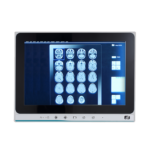 MPC103-845 – Ultra Slim 10.1-Inch Fanless Medical Grade Touch Panel Computer
MPC103-845 – Ultra Slim 10.1-Inch Fanless Medical Grade Touch Panel Computer
- EN 60601-1-certified touch panel PC with dual-core, low power Intel® Celeron® Processor N3060
- WXGA TFT LCD display with LED backlight and 350 nits of brightness
- IP65, NEMA 4 rugged front bezel to protect against liquid spillage and dust
- Two PCIe Mini Card slots available for RFID, 3G, Bluetooth or Wi-Fi connection
MPC152-845 – Rugged 15-Inch Fanless Medical Grade Touch Panel Computer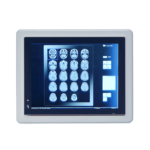
- EN 60601-1-certified touch panel PC with dual-core, low power Intel® Celeron® Processor N3060
- XGA TFT LCD display with LED backlight and 420 nits of brightness
- Rich I/O options with two GbE LANs, two USB 2.0, two USB 3.0, one RS232 and one RS-232/422/485
- Two PCIe Mini Card slots available for RFID, 3G, Bluetooth or Wi-Fi connection
MPC102-845 – Expandable, Compact 10.4-Inch Fanless Medical Grade Touch Panel Computer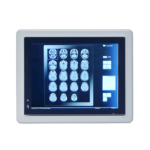
- EN 60601-1-certified touch panel PC with dual-core, low power Intel® Celeron® Processor N3060
- XGA TFT LCD with LED backlight and 350 nits of brightness
- IP65, NEMA 4 rugged front bezel to protect against liquid spillage and dust
- Flexible power options with wide voltage range of 100V-240V AC-DC with 60W power adapter or optional 9V-36V DC with terminal block

